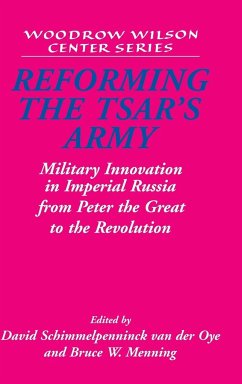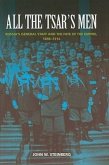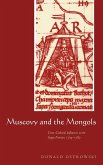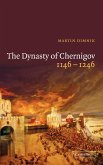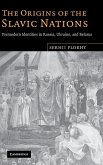Short description/annotation
Examines how Imperial Russia's armed forces sought to adapt to the challenges of modern warfare.
Main description
This volume examines how Imperial Russia's armed forces sought to adapt to the challenges of modern warfare. Russian rulers always understood the need to maintain an army and navy capable of preserving the empire's great power status. Yet they inevitably faced the dilemma of importing European military and technological innovations while keeping out political ideas that could challenge the autocracy's monopoly on power. Reforming the Tsar's Army touches on many broader issues in politics, international relations, economy and society, and combines the efforts of leading specialists of Russian military history from North America, Europe and Russia to consider many aspects of this dilemma. Grouped around broad themes of resources, intelligence, personality, and responses to specific wars, these essays benefit from the new archival openness to yield some surprising insights into the empire's willingness and ability to adapt to change.
Table of contents:
Part I. Population, Resources, and War: 1. Universal service reform: conception to implementation, 1873-83 Robert F. Baumann; 2. The limits of reform: the multiethnic imperial army confronts Nationalism, 1874-1917 Mark von Hagen; 3. Forerunners of the Komsomol: scouting in imperial Russia David R. Jones; 4. Strategic railroads and the dilemmas of modernization Jacob W. Kipp; Part II. Intelligence and Knowledge: 5. The Russian military press in the reform era Willis Brooks; 6. Reforming military intelligence David Schimmelpenninck van der Oye; 7. Russian military attachés and the wars of the 1860s Gudrun Persson; 8. Building foundations for effective intelligence: military geography and statistics in Russian perspective, 1845-1905 David Alan Rich; Part III. Responses to Specific Wars: 9. Russian military reform in the age of Napoleon Frederick W. Kagan; 10. The caucasus factor in Russian military reform Dmitrii I. Oleinikov; 11. The offensive revisited: Russian preparation for future war, 1906-14 Bruce W. Menning; 12. The challenge of reforming imperial Russian general staff education, 1905-9 John W. Steinberg; Part IV. Personalities: 13. The politics of command in the army of Peter the Great Paul Bushkovitch; 14. G. A. Potemkin and A. I. Chernyshev: two dimensions of reform and Russia's military frontier Bruce W. Menning; 15. Miliutin contra Moltke: Russia's refusal to accept a Prussian-style general staff Oleg Airapetov; Part V. Conclusions: 16. The military and imperial Russian history David M. McDonald; 17. Imperial Russia and military history Dennis Showalter; 18. Russian military history and the present William E. Odom.
Examines how Imperial Russia's armed forces sought to adapt to the challenges of modern warfare.
Main description
This volume examines how Imperial Russia's armed forces sought to adapt to the challenges of modern warfare. Russian rulers always understood the need to maintain an army and navy capable of preserving the empire's great power status. Yet they inevitably faced the dilemma of importing European military and technological innovations while keeping out political ideas that could challenge the autocracy's monopoly on power. Reforming the Tsar's Army touches on many broader issues in politics, international relations, economy and society, and combines the efforts of leading specialists of Russian military history from North America, Europe and Russia to consider many aspects of this dilemma. Grouped around broad themes of resources, intelligence, personality, and responses to specific wars, these essays benefit from the new archival openness to yield some surprising insights into the empire's willingness and ability to adapt to change.
Table of contents:
Part I. Population, Resources, and War: 1. Universal service reform: conception to implementation, 1873-83 Robert F. Baumann; 2. The limits of reform: the multiethnic imperial army confronts Nationalism, 1874-1917 Mark von Hagen; 3. Forerunners of the Komsomol: scouting in imperial Russia David R. Jones; 4. Strategic railroads and the dilemmas of modernization Jacob W. Kipp; Part II. Intelligence and Knowledge: 5. The Russian military press in the reform era Willis Brooks; 6. Reforming military intelligence David Schimmelpenninck van der Oye; 7. Russian military attachés and the wars of the 1860s Gudrun Persson; 8. Building foundations for effective intelligence: military geography and statistics in Russian perspective, 1845-1905 David Alan Rich; Part III. Responses to Specific Wars: 9. Russian military reform in the age of Napoleon Frederick W. Kagan; 10. The caucasus factor in Russian military reform Dmitrii I. Oleinikov; 11. The offensive revisited: Russian preparation for future war, 1906-14 Bruce W. Menning; 12. The challenge of reforming imperial Russian general staff education, 1905-9 John W. Steinberg; Part IV. Personalities: 13. The politics of command in the army of Peter the Great Paul Bushkovitch; 14. G. A. Potemkin and A. I. Chernyshev: two dimensions of reform and Russia's military frontier Bruce W. Menning; 15. Miliutin contra Moltke: Russia's refusal to accept a Prussian-style general staff Oleg Airapetov; Part V. Conclusions: 16. The military and imperial Russian history David M. McDonald; 17. Imperial Russia and military history Dennis Showalter; 18. Russian military history and the present William E. Odom.

